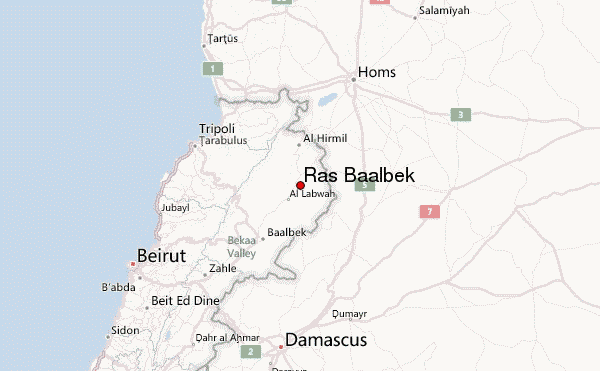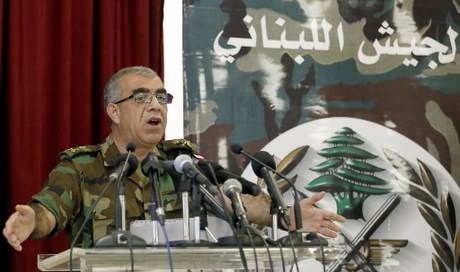 The Lebanese army launched an offensive on Saturday against an Islamic State enclave on the northeastern border with Syria, as the Iranian backed Lebanese Shi’ite militant group Hezbollah announced an assault on the militants from the Syrian side of the frontier.
The Lebanese army launched an offensive on Saturday against an Islamic State enclave on the northeastern border with Syria, as the Iranian backed Lebanese Shi’ite militant group Hezbollah announced an assault on the militants from the Syrian side of the frontier.
The Lebanese army operation got underway at 5 a.m. (0200 GMT), targeting Islamic State positions near the town of Ras Baalbek with rockets, artillery and helicopters, a Lebanese security source said. The area is the last part of the Lebanese-Syrian frontier under insurgent control.
A security source said the offensive was making advances with several hills taken in the push against the militants entrenched on fortified high ground, in outposts and in caves.
The operation by Hezbollah and the Syrian army targeted the area across the border in the western Qalamoun region of Syria.
Hezbollah-run al-Manar TV said that its fighters were ascending a series of strategic heights known as the Mosul Mountains that overlook several unofficial border crossings used by the militants.
A Hezbollah statement said the group was meeting its pledge to “remove the terrorist threat at the borders of the nation” and was fighting “side by side” with the Syrian army.
It made no mention of the Lebanese army operation.
The Lebanese army said it was not coordinating the assault with Hezbollah or the Syrian army.
SENSITIVE
Any joint operation between the Lebanese army on the one hand and Hezbollah and the Syrian army on the other would be politically sensitive in Lebanon and could jeopardize the sizeable U.S. military aid the country receives.
Washington classifies the Iran-backed Hezbollah as a terrorist group.
No coordination with Hezbollah or Syrian army

The Lebanese army has sought to keep out of the conflict but has been forced to take action since jihadists of IS and then Al-Qaeda affiliate Al-Nusra Front assaulted the border town of Arsal in 2014 and abducted 30 soldiers and police. / AFP PHOTO / ANWAR AMRO
“There is no coordination, not with Hezbollah or the Syrian army,” General Ali Kanso said in a televised news conference, adding that the army had started to tighten a siege of IS in the area two weeks ago.
As for the number of militants and their distribution in said areas, Qanso said the “army believed there were around 600 IS fighters in the two areas, controlling some 120 square kilometers (46 square miles) of territory.”
Assuring that part of the army’s mission is to uncover the fate of Lebanese servicemen captured by the IS, he said: “Uncovering the fate of captive servicemen held by IS is our priority. This military offensive has no time limit.”
Nine Lebanese soldiers captured during the 2014 raid are believed to remain in the hands of the jihadists.
Four were executed by their captors while a fifth died of his wounds. Sixteen were released in a prisoner swap in December 2015.
“It’s the most difficult battle so far waged by the Lebanese army against terrorist groups – the nature of the terrain and the enemy,” he said, characterizing the 600 Islamic State fighters in the area as 600 “suicide bombers”.
In a recent speech, Hezbollah leader Sayyed Hassan Nasrallah said the Lebanese army would attack Islamic State from its side of the border, while Hezbollah and the Syrian army would simultaneously assault from the other side.
A commander in the military alliance fighting in support of President Bashar al-Assad said that “naturally” there was coordination between the operations.
Last month, Hezbollah forced Nusra Front militants and Syrian rebels to leave nearby border strongholds in a joint operation with the Syrian army.
The Lebanese army did not take part in the July operation, but it has been gearing up to assault the Islamic State pocket in the same mountainous region.
Footage broadcast by Hezbollah-run al-Manar TV showed the group’s fighters armed with assault rifles climbing a steep hill in the western Qalamoun.
The Lebanese Shi’ite group has had a strong presence there since 2015 after it defeated Syrian Sunni rebels who had controlled local villages and towns.
Many rebels, alongside thousands of Sunni refugees fleeing violence and Hezbollah’s control over their towns, took shelter on the Lebanese side of the border strip.
Hezbollah has provided critical military support to President Bashar al-Assad during Syria’s six-year-long war. Its Lebanese critics oppose Hezbollah’s role in the Syrian war.
Northeastern Lebanon was the scene of one of the worst spillovers of Syria’s war into Lebanon in 2014, when Islamic State and Nusra Front militants attacked the town of Arsal.
The fate of nine Lebanese soldiers taken captive by Islamic State in 2014 remains unknown.
Hezbollah and its allies have been pressing the Lebanese state to normalize relations with Damascus, challenging Lebanon’s official policy of neutrality towards the conflict next door.
REUTERS
Note to Ya Libnan readers
Ya Libnan is not responsible for the comments that are posted below. We kindly ask all readers to keep this space respectful forum for discussion
All comment that are considered rude, insulting, a personal attack, abusive, derogatory or defamatory will be deleted
Ya Libnan will also delete comments containing hate speech; racist, sexist, homophobic slurs, discriminatory incitement, or advocating violence, public disorder or criminal behavior profanity , crude language and any words written in any language other than English.

Leave a Reply
You must be logged in to post a comment.